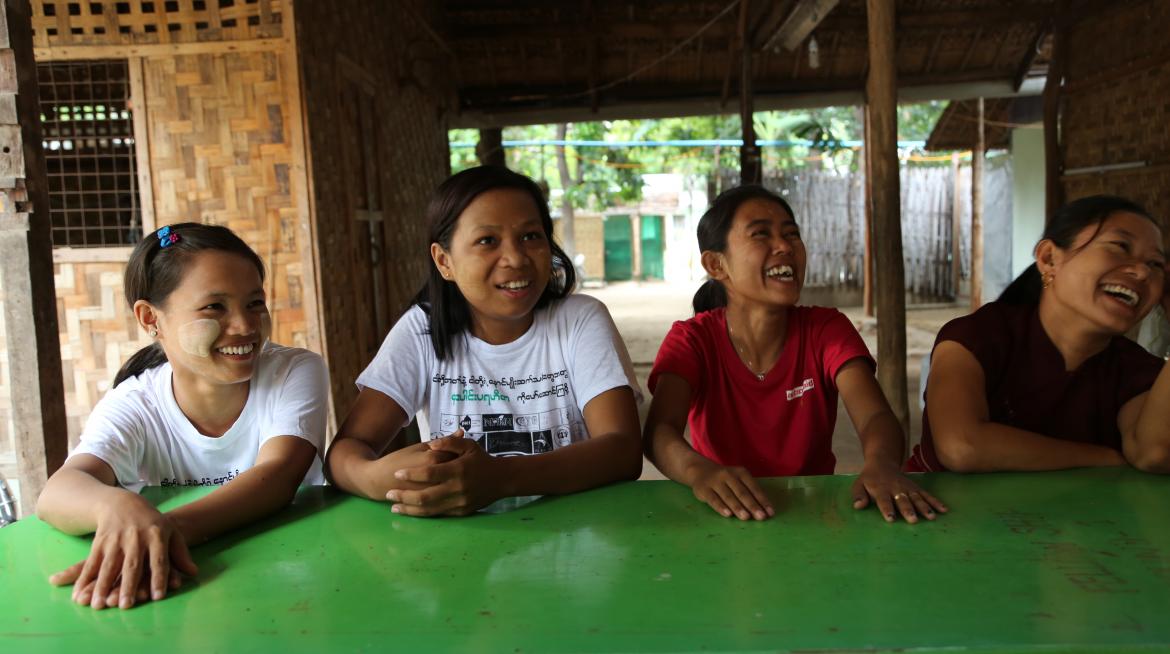
The completion last month of the government funded Yin Taing Taung Dam in the Dry Zone’s Myaing district is more than a relief for the four parched local village and farming communities that it will service. It’s also a major achievement for the group of determined young women who rallied the villagers and lobbied local government to make it happen.
One of the features of the multi-donor Livelihoods and Food Security Trust Fund (LIFT) is that it places sustainability at the heart of its rural development programming activities, with the aim that the ripple effects of its funding will continue long after a project has drawn to a close.
One way to achieve this is to inspire local communities to make their own development decisions by providing them with the knowledge and confidence to get things done. The story of the Yin Taing Taung Dam shows that this approach not only works – it can be extremely effective.
In 2011, LIFT funded the non-government organisation ActionAid ‘s three-year Community-Initiated Livelihoods and Poverty Reduction project. This provided training to young volunteers, called Fellows, in the rudiments of development theory and then set them at large on their communities to act as ‘facilitators of change’. The process involved an intense first month of participatory training.
“In the early days I went home every evening and cried,” says Chan, a 24-year-old Fellow from Myaing Township, “There was so much information to take in, all that thinking and brainstorming. I just couldn’t absorb it all!” She laughs at the memory. “Then I realised that what I was being taught could help the people of my community.”
We’re sitting in ActionAid’s airy offices in Khamma Township, near Myaing, late on a hot Friday afternoon. Chan is one of four self –assured young women who have come after their day’s work to explain to me what has happened as a result of their training.
The women have quite a reputation. Earlier in the day, members of the community raised eyebrows and smiled when they heard that I was meeting them. “Those girls are fearless,” said one Khamma resident; “They are James Bond,” quipped ActionAid’s driver.
After the first training series, the young women returned to their communities tasked with identifying its most pressing needs. This involved getting known by the villagers, building relationships of trust and confidence, setting up village meetings and doing home visits. All four admit that at first they were barely tolerated – the youngest, Nyein Nyein Phyo, was a mere 19 years old at the time – but after ‘more tears’ and continued support from ActionAid, friends and family, they were gradually accepted and the communities began to listen, participate and produce village books that listed the needs and aspirations of the communities, while tracing the root causes of their poverty.
Progress was slow, however. Hearing the experience of other Fellows proved to be vitally important when the girls attended ActionAid’s Governance and Active Citizenship training in Yangon. “I learned that senior Fellows had established their own community based organisations, and thought that we could do this, not only in our communities but across the region,” said Nan Ei Htay, now aged 28, “and this is how the Yin Taing Taung Dam project came about,” added Myat Myat Htwe, also 28.
The girls enlisted the help of the older women in the villages and, re-enforcing traditional village structures, organised them into what they nicknamed “granny groups”, thereby promoting the role of women in village decision making. The village books traced the main cause of poverty and hardship back to lack of a reliable water source. To address this, the elder women suggested building a large- scale dam at Yin Taing Taung.
By this time the LIFT funded project had completed and the Fellows were working on their own accord.
How to fund the dam was the next challenge. The Fellows then started to work at a regional level coordinating with each other to draw together granny groups and rally other villages – well past the original project area - who would benefit from the proposed dam. Acting as catalysts, the Fellows passed on their advocacy skills to guide these communities to approach government and then they watched on as the communities secured US $200,000, (around two million kyat) of government funding to build the dam.
The dam is to first serve its four closest communities, and any excess water will extend to a further six villages for both domestic and agricultural use. Aside from freeing women and children from having to walk miles every day to collect water, it is expected that the dam will allow a second yearly crop for many of the farmers in the area, dramatically improving their incomes. The elder women groups and other community members were closely involved in consultations on the dam design and construction, for example, bringing knowledge of the local conditions to decide best position for the sluice gates. In this way, ownership of the dam has been set.
After their experience, the four Fellows are clearly close friends or ‘comrades in arms’. Their conversation is animated - they cut in on each other’s chat, finish one another’s sentences, and all exude a sparkling self-confidence – a far cry from their situation three years ago when, they say, they trembled in front of the smallest village audience.
But having rallied the community to identify their needs and equip them with evidence to lobby for government support to meet those needs, they say that anything is possible. The four are now busy working on other development projects.
“This country’s development is actually our responsibility, we all can be an active part of it,” says Nyein Nyein Phyo, now aged 22. “Our own efforts can really make a difference.”
by Jacquetta Hayes, Communications Officer, LIFT


